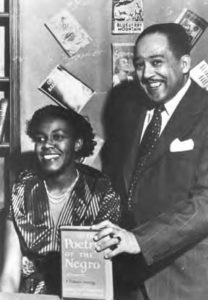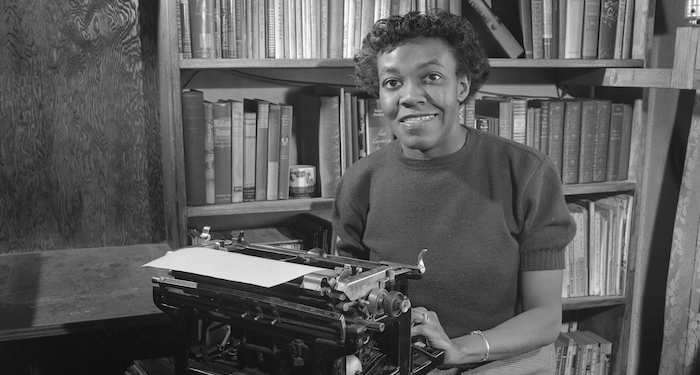I remember the day well: an outstanding 7th grade English teacher read “We Real Cool,” one of the best poems by Gwendolyn Brooks.
Mrs. Levin read the poem “We Real Cool” in a soft monotone, in a dull thud of a voice that hit the listener hard: all the better to see the men portrayed in this masterpiece of a ten-line poem.
The power and the beauty of poems by Gwendolyn Brooks has been a constant companion of mine the many decades since that day of introduction. If you’re a new reader, this is where to start.
Who Was Gwendolyn Brooks?

Gwendolyn Brooks and Langston Hughes/ 1949 photo Chicago Public Library Collections
Simply put, Gwendolyn Brooks was one of the most influential and most recognized poet of the 20th century. She was the known for her consummate craftsmanship of the written word. She was the first African American to win the Pulitzer Prize in 1950 and one of the first poet laureates recognized by the Library of Congress. Brooks was known for her generosity to younger poets and for using the power of her pen to work for social justice.
Gwendolyn Brooks was born on June 17, 1917, in Topeka, Kansas, but her family moved to Chicago when Brooks was young. Her father was a janitor and her mother a schoolteacher; both parents were strong supporters of their child’s love for reading and for writing poetry.
By the time Brooks was 17, her poems were often published by the Chicago Defender, the newspaper that served Chicago’s African American citizens. She attended junior college and worked with the Chicago chapter of the National Association for the Advancement of Colored People (NAACP).
However, the poetry and writing workshops that she attended in the 1930s, funded through the Works Progress Administration of President Roosevelt and often taught by Langston Hughes and Countee Cullen of the Harlem Renaissance, are when Brooks realized she was a poet.
But she would not just be any poet. Brooks distinguished herself with her astounding portrayals of the African American people of her South Side of Chicago neighborhood. Brooks knew and respected and loved the people of Chicago’s South Side—it is through the lives of Brooks’s subjects that we can comprehend the historical and cultural transformations of the last century.
Poems by Gwendolyn Brooks
We Real Cool
THE POOL PLAYERS.
SEVEN AT THE GOLDEN SHOVEL.
We real cool. We
Left school. We
Lurk late. We
Strike straight. We
Sing sin. We
Thin gin. We
Jazz June. We
Die soon.
A Song In The Front Yard
I’ve stayed in the front yard all my life.
I want a peek at the back
Where it’s rough and untended and hungry weed grows.
A girl gets sick of a rose.
I want to go in the back yard now
And maybe down the alley.
To where the charity children play.
I want a good time today.
They do some wonderful things.
They have some wonderful fun.
My mother sneers, but I say it’s fine
How they don’t have to go in at quarter to nine.
My mother, she tells me that Johnnie Mae
Will grow up to be a bad woman.
That George’ll be taken to jail soon or late
(On account of last winter he sold our back gate).
But I say it’s fine. Honest, I do.
And I’d like to be a bad woman, too.
And wear the brave stockings of night-black lace
And strut down the streets with paint on my face.
To Be in Love
To be in love is to touch with a lighter hand.
In yourself you stretch, you are well.
You look at things Through his eyes.
A cardinal is red.
A sky is blue.
Suddenly you know he knows too.
He is not there but
You know you are tasing together
The winter, or a light spring weather.
His hand to take your hand is overmuch.
Too much to bear.
You cannot look in his eyes
Because your pulse must not say
What must not be said.
When he
Shuts a door—
Is not there—
Your arms are water.
And you are free
With a ghastly freedom.
You are the beautiful half
Of a golden hurt.
You remember and covet his mouth
To touch, to whisper on.
Oh when to declare
Is certain Death!
Oh when to apprize
Is to mesmerize.
To see fall down, the Column of Gold.
Into the commonest ash.
Sadie and Maud
Maud went to college.
Sadie stayed home.
Sadie scraped life
With a fine toothed comb.
She didn’t leave a tangle in
Her comb found every strand,
Sadie was one of the livings chicks
In all the land.
Sadie bore two babies
Under her maiden name.
Maud and Ma and Papa
Nearly died of shame.
When Sadie said her last so-long
Her girls struck out form home.
(Sadie left as heritage
Her fine-tooth comb.)
Maud, who went to college,
Is a thin brown mouse.
She is living all alone
In this old house.
A Sunset of the City
Already I am no longer looked at with lechery or love.
My daughters and sons have put me away with marbles and dolls,
Are gone from the house.
My husband and lovers are pleasant or somewhat polite
And night is night.
It is a real chill out,
The genuine thing.
I am not deceived, I do not think it is still summer
Because sun stays and birds continue to sing.
It is summer-gone that I see, it is summer-gone.
The sweet flowers in drying and dying down,
The grasses forgetting their blaze and consenting to brown.
It is a real chill out. The fall crisp comes.
I am aware there is winter to heed.
There is no warm house
That is fitted with my need.
I am cold in this cold house this house
Whose washed echoes are tremulous down lost halls.
I am a woman, and dusty, standing among new affairs.
I am a woman who hurries through her prayers.
The intimations of a quiet core to be my
Desert and my dear relief
Come: there shall be such slanging from grief,
And small communion with the master shore.
Twang they. And I incline this ear to tin,
Consult a dual dilemma. Whether to dry
In humming pallor or to leap and die.
Somebody muffled it? Somebody wanted to joke.
The Lovers of the Poor
arrive. The Ladies from the Ladies’ Betterment League
Arrive in the afternoon, the late light slanting
In diluted gold bars across the boulevard brag
Of proud, seamed faces with mercy and murder hinting
Here, there, interrupting, all deep and debonair,
The pink paint on the innocence of fear;
Walk in a ginelrgly manner up the hall.
Cutting with knives served by their softest care,
Served by their love, so barbarously fair.
Whose mothers taught: You’d better not be cruel!
You had better not throw stones upon the wrens!
Anew and dearly in the innocence
With which they baffle nature. Who are full,
Sleek, tender-clad, fit, fiftyish, a-glow, all
Sweetly abortive, hinting at fat fruit,
Judge it high time that fiftyish fingers felt
Beneath the lovelier planes of enterprise.
To resurrect. To moisten with milky chill.
To be a random hitching post or plush.
To be, for wet eyes, random and handy hem.
Their guild is giving money to the poor.
the worthy poor.
The very, very worthy
And beautiful poor. Perhaps just not too swarthy?
Perhaps just not too dirty nor too dim
Nor-passionate. In truth, what they could wish
Is – something less than derelict or dull.
Not staunch enough to stab, though, gaze for gaze!
Gold shield them sharply from the beggar-bold!
The noxious needy ones whose battle’s bald
Nonetheless for being voiceless, hits one down.
But it’s all so bad! and entirely too much for them.
The stench; the urine, cabbage, and dead beans,
The old smoke, heavy diapers, and, they’re told,
Something called chitterlings. The darkness. Drawn
Darkness, or dirty light. The soil that stirs.
The soil that looks the soil of centuries.
And for that matter the general oldness. Old
Wood. Old marble. Old tile. Old old old.
Not homeland Oldness! Not Lake Forest, Glencoe.
Nothing is sturdy, nothing is majestic,
There is no quiet drama, no rubbed glaze, no
Unkillable infirmity of such
A tasteful turn as lately they have left,
Glencoe, Lake Forest, and to which their cars
Must presently restore them. When they’re done
With dullards and distortions of this fistic
Patience of the poor and put-upon.
They’ve never seen such a make-do-ness as
Newspaper rugs before! In this, this “flat,”
Their hostess is gathering up the oozed, the rich
Rugs of the morning (tattered! the bespattered…),
Readies to spread clean rugs for afternoon.
Here is a scene for you. The Ladies look,
In horror, behind a substantial citizeness
Whose trains clank out across her swollen heart.
Who, arms akimbo, almost fills a door.
All tumbling children, quilts dragged to the floor
And tortured there over, potato peelings, soft-
Eyed kitten, hunched-up, haggard, to-be-hurt.
Their League is allotting largest to the Lost.
But to put their clean, their pretty money, to put
Their money collected from delicate rose-fingers
Tipped with their hundred flawless rose-nail seems…
they own Spode, Lowestoff, candelabra,
Mantels, and hostess gowns, and sunburst clocks,
Turtle soup, Chippendale, red sating “hangings,”
Aubussons and Hattie Carnegie. They Winter
In Palm Beach; cross the Water in June; attend,
When suitable, the nice Art Institue;
Buy the right books in the best bindings; saunter
On Michigan, Easter mornings, in sun or wind.
Oh Squalor! This sick four-story hulk, this fibre
With fissures everywhere! Why, what are bringings
Of loathe-love To no more Possibilities, to get
Away. Perhaps the money largesse? Shall peril hungers
So old old, what shall flatter the desolate?
Tin can, blocked fire escape and chitterling
And swaggering seeking youth and the puzzled wreckage
Of the middle passage, and urine and stale shames
And, again, the porridges of the underslung
And children children children. Heavens! That
Was a rat, surely off there, in the shadows? Long
And Long-tailed? Gray? The Ladies from the Ladies’
Betterment League agree it will be better
To achieve the outer air that rights and steadies,
To hie to a house that does not holler, to ring
Bells else time, better presently to cater,
To no more Possibilities, to get
Away. Perhaps the money can posted.
Perhaps they two may choose another Slum!
Some serious sooty half-unhappy home!-
Where loathe-lover likelier may be invested.
Keeping their scented bodies in the center
Of the hall as they walk down the hysterical hall,
They allow their lovely skirts to graze no wall,
Are off at what they mange of a canter,
And, resuming all the clues of what they were,
Try to avoid the inhaling of laden air.
What are your favorite poems by Gwendolyn Brooks?
